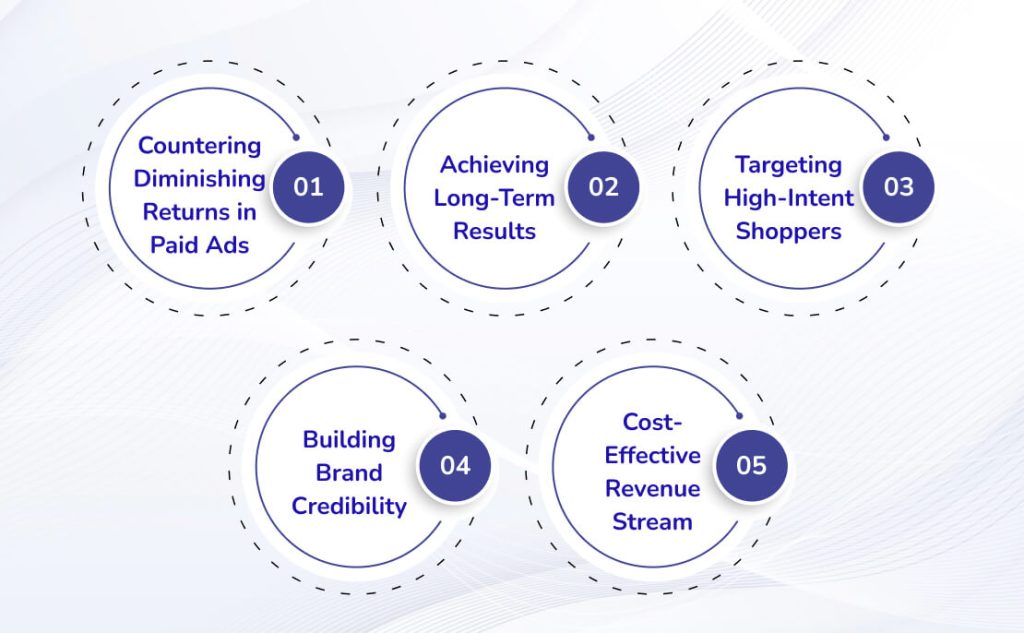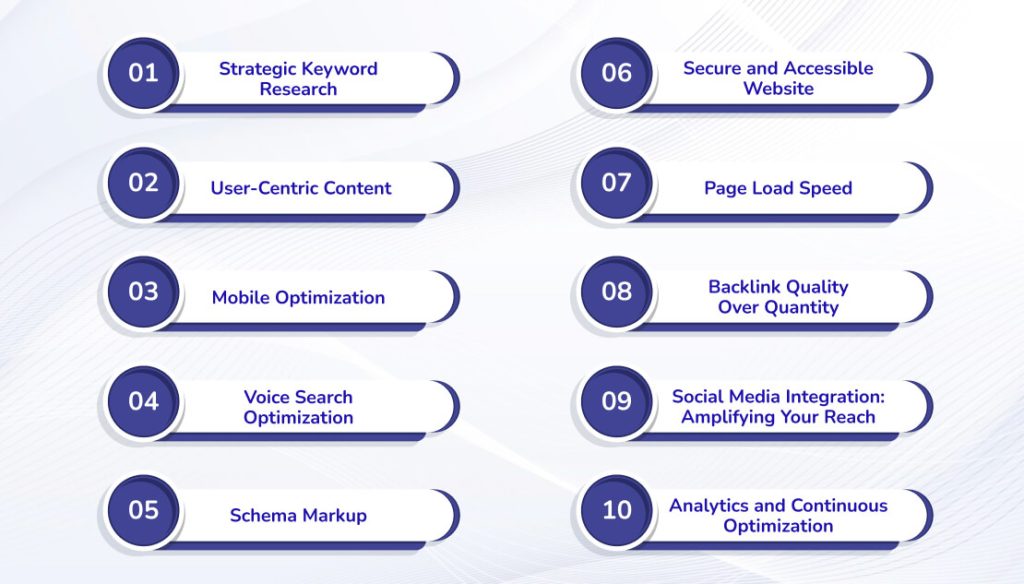When your business operates online, the success of your eCommerce store heavily depends on its visibility in search engines. If your eCommerce website doesn’t appear in search results, attracting customers becomes a significant challenge, impacting your potential earnings. But fear not! We’ve put together a set of easy-to-follow eCommerce SEO best practices to help you effectively optimize your online store, ensuring it ranks high in search engine results and steering clear of common SEO pitfalls. Let’s dive into these guidelines to give your e-commerce website the best shot at thriving in organic search.
If you’d like personalized assistance in implementing these SEO best practices for your e-commerce site, feel free to give us our eCommerce company. We’re here to help you make the most of your online presence.
What is E-commerce SEO?
If the term “search engine optimization” (SEO) is new, it’s time to acquaint yourself! E-commerce SEO is fine-tuning a website per the guidelines set by major search engines such as Google, Bing, and Yahoo. The ultimate goal? To make your website appear more frequently and secure a higher ranking in search results.
Refrain from letting the idea of SEO being challenging deter you. Understanding and implementing SEO best practices for eCommerce is more achievable than it may seem. Many web admins and store owners have inadvertently embraced these practices for years. However, with the escalating online competition and the continuous influx of e-commerce stores, ensuring your site is top-notch has never been more crucial.
SEO comprises various tactics aimed at enhancing your search engine performance. This includes crafting content enriched with relevant keywords, designing a user-friendly website, and optimizing elements like page titles and URLs. While some of these strategies may already be part of your routine, others might be novel concepts you’ve yet to explore.
In the dynamic digital landscape, keeping your site in top shape with effective SEO practices is not just a recommendation—it’s a necessity. So, let’s unravel the world of e-commerce SEO and propel your website to new heights of visibility and success!
The Benefits of Investing in SEO

Crafting a deliberate e-commerce SEO strategy isn’t just a smart move it’s a game-changer for your business. Let’s explore the myriad advantages that come with adopting an intentional SEO approach:
1. Countering Diminishing Returns in Paid Ads:
Dynamic Marketing Landscape: Paid ads face challenges, especially for small businesses, due to escalating costs and diminishing effectiveness. SEO, in contrast, offers a more stable and enduring solution.
2. Achieving Long-Term Results:
Investment in Sustainability: Unlike continuous investment in paid ads, an investment in SEO pays off in the long run. As your website climbs the search result ranks, the organic traffic to your pages grows steadily, enhancing credibility and driving sustained sales.
3. Targeting High-Intent Shoppers:
Quality over Quantity: SEO allows you to attract a select audience with high purchase intent. While paid ads may generate higher traffic volumes, SEO makes visitors genuinely interested in your offerings. This results in higher conversion rates and more predictable, valuable traffic.
4. Building Brand Credibility:
Top-Tier Visibility: Securing top positions in search results boosts your brand’s credibility. Being at the forefront not only garners more attention but also increases sales.
5. Cost-Effective Revenue Stream:
Stability in Returns: While the upfront investment or time commitment for SEO may seem significant, it pales compared to the consistent input required for paid ads. SEO establishes a stable, ongoing source of revenue, ensuring your business thrives without perpetual financial injections.
Embracing SEO best practices isn’t just a tactical move; it’s a strategic investment in the sustained growth of your e-commerce business. Now, let’s dive into the actionable SEO practices that can propel your online venture to new heights.
Why eCommerce Websites care about SEO
When you embark on a quest for information on Google, the Search Engine Results Page (SERP) is the gateway. Here, approximately ten organic results unfold, jostling for your attention:
Amidst this digital arena, organic results emerge beneath the banner of paid ads (in orange) and Google Shopping ads (in purple):
E-commerce SEO is the strategic endeavour to secure prime placement for your product pages within these organic search results, ideally gracing the illustrious first page of Google. Why the emphasis on the first page? Put, websites residing beyond the top 10 seldom witness substantial traffic. Even those between three and five pale compared to the coveted top spots.
A noteworthy revelation: Backlinko, an SEO authority, uncovered that a mere 0.63% of searchers bother venturing to page two of Google search results. Furthermore, their research divulged that the first result on a Google SERP captures 27.6% of all clicks. SEO isn’t just a buzzword—it’s the linchpin of online visibility and success.
10 Tips for Successful E-commerce SEO

In the dynamic landscape of eCommerce, where competition is fierce, and the digital marketplace is evolving rapidly, mastering Search Engine Optimization (SEO) is more critical than ever. As we enter 2024, online businesses must stay ahead of the curve and adopt effective strategies to enhance their visibility, attract organic traffic, and drive conversions. Here are ten essential eCommerce SEO tips to navigate the complexities of the digital realm successfully.

1. Strategic Keyword Research
Keyword research remains the cornerstone of any successful SEO strategy. In 2024, it’s not just about identifying high-volume keywords but understanding user intent. Utilize advanced keyword research tools to uncover long-tail keywords and phrases that align with your products or services. Focus on intent-based keywords that reflect user queries, ensuring your content meets their needs effectively.
2. User-Centric Content
Content is king, but in 2024, quality is emphasized over quantity. Create compelling, informative, and engaging content that resonates with your target audience. Long-form content that addresses user queries comprehensively performs well. Incorporate multimedia elements, such as videos and infographics, to enhance user experience and keep visitors on your site longer.
3. Mobile Optimization
With the prevalence of mobile devices, optimizing your eCommerce site for mobile is non-negotiable. Search engines prioritize mobile-friendly websites, considering the growing number of users accessing the internet through smartphones and tablets. Implement responsive design, optimize page load speed, and ensure a seamless user experience across various devices.
4. Voice Search Optimization
The rise of voice-activated devices has transformed the way users search for information. Incorporate conversational and natural language in your content to align with voice search queries. Consider the context and intent behind voice searches, adapting your content to address these evolving search patterns effectively.
5. Schema Markup
Schema markup provides search engines with structured data about your products, services, and content. Implementing schema markup enhances your chances of appearing in rich snippets, which can significantly boost click-through rates. Take advantage of schema types relevant to eCommerce, such as Product, Review, and FAQ schema, to provide additional information in search results.
6. Secure and Accessible Website
Website security and accessibility are paramount in 2024. Secure your site with HTTPS to build trust with users and signal to search engines that your platform is safe. Additionally, prioritize accessibility features to ensure your website is usable by individuals with disabilities. Search engines reward websites that prioritize user trust and inclusivity.
7. Page Load Speed
In the fast-paced digital world, users demand speedy experiences. Page load speed directly impacts user satisfaction and search engine rankings. Optimize your website’s performance by compressing images, leveraging browser caching, and utilizing Content Delivery Networks (CDNs). A faster website improves SEO, reduces bounce rates, and enhances the overall user experience.
8. Backlink Quality Over Quantity
Backlinks remain a crucial ranking factor, but the emphasis has shifted to quality over quantity. Focus on acquiring high-quality, authoritative backlinks from reputable sources within your industry. Foster relationships with influencers and thought leaders, creating content that naturally attracts backlinks. Google values contextual and relevant links, contributing to your site’s authority and credibility.
9. Social Media Integration: Amplifying Your Reach
While social signals may not directly impact search rankings, social media integration can amplify your online presence. Utilize social media marketing services platforms to promote your products, engage with your audience, and drive traffic to your eCommerce site. Social shares can indirectly increase visibility and brand awareness, influencing user behaviour and search engine perceptions.
10. Analytics and Continuous Optimization
In the evolving landscape of eCommerce SEO, data-driven decision-making is indispensable. Leverage analytics tools to monitor user behaviour, track key performance indicators (KPIs), and gain insights into the effectiveness of your SEO strategies. Continuously optimize your approach based on data, adapting to algorithm changes, emerging trends, and user preferences.
Conclusion
Mastering eCommerce SEO in 2024 requires a holistic approach considering user intent, technical optimization, and adaptability to industry shifts. By implementing these ten essential tips, your eCommerce business can navigate the competitive digital landscape, enhance visibility, and drive sustainable growth through organic search traffic. Stay agile, stay informed, and embrace the dynamic nature of eCommerce SEO to position your business for success in the years to come.
Frequently Asked Questions About eCommerce SEO Tips
To kick off your e-commerce venture with SEO in mind, begin by optimizing key on-page elements of your website. This includes refining product descriptions, enhancing user experience (UX), and improving page speed. After your website is well-optimized, focus on building backlinks and employing advanced e-commerce SEO strategies for sustained growth and visibility.
When focusing on SEO for e-commerce, there are several key areas to optimize:
Product Pages and Descriptions: Ensure your product pages are detailed and include relevant keywords. Use clear, concise, and persuasive language to describe your products. Incorporate customer reviews and FAQs to add value and improve search rankings.
Diversifying Product Content and Information: Provide a variety of content formats, such as videos, how-to guides, and user-generated content. This engages customers and improves SEO by offering rich, varied information.
Images on Your Website: Optimize high-quality photos with descriptive, keyword-rich file names and alt text. This helps search engines understand the content and improves your chances of appearing in image search results.
Your homepage should be optimized with relevant keywords and have a straightforward, user-friendly design. Include links to essential categories and products to effectively guide users and search engines through your site.
Finding the right keywords is essential for e-commerce optimization. Here are some user-friendly tips to get you started:
Use Free Tools for Keyword Ideas: Tools like Google Ads, Ubersuggest, and Google’s Keyword Planner are excellent for generating keyword ideas. These tools provide insights into keyword volume, competition, and trends, helping you identify the most relevant keywords for your e-commerce site.
Analyze Competitors: Look at the keywords your competitors are using. This can give you a good idea of what works in your industry and help you identify opportunities to target similar keywords.
Focus on Long-Tail Keywords: Avoid broad keywords that might attract a lot of clicks but don’t convert well. Instead, use long-tail keywords – these are more specific phrases that potential customers are likely to use when they are closer to making a purchase. Long-tail keywords often have lower competition and higher conversion rates.
Link building is often the most overlooked aspect of SEO for e-commerce brands. Many store owners focus on perfecting their on-page optimization, thinking it’s enough. However, building backlinks remains crucial for competing in search engine rankings, especially for highly competitive keywords. Neglecting link building can limit your site’s visibility and growth potential.
The cost of SEO for e-commerce varies widely based on several factors, including the keywords you target, the competition in your niche, and the amount of work needed to optimize your site. Determining a precise cost isn’t straightforward because it depends on your goals and allocated resources.
To help you estimate your SEO expenses, you can use tools like the SEO budget calculator from Search Engine Journal. This tool can give you a better idea of what to expect based on your unique needs and objectives.

Seeking to Enhance your eCommerce Store’s Visibility in 2024? Want to Drive More Organic Traffic?

Pooja Upadhyay
Director Of People Operations & Client Relations

